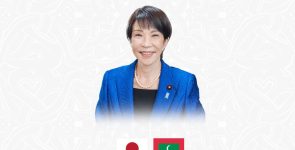
The Islamic University of Maldives (IUM) has launched financing efforts by selling Sharia-compliant bonds known as ‘Sukuk’ to construct the university’s ‘Sanabil’ building project in Hulhumale Phase 1.
In a special ceremony at IUM last night, the university revealed that 60 securities – each with a face value of MVR 1 million – were released for IUM’s Sanabil project, which has a fundraising target of MVR 60 million.
The Capital Market Development Authority (CMDA) and the Maldives Stock Exchange (MSE) have granted the necessary approvals for listing the securities issued. Investors can buy Sukuk through the Viyana portal of the Maldives Stock Exchange starting from the 23rd of this month.
IUM also mentioned that Watercress Capital Pvt Ltd of Malé is the project’s lead manager and that several major companies in Malé have shown interest in investing.
The ‘Sanabil’ building is an eight-storey structure with modern facilities such as an auditorium, hall, laboratories, classrooms, and office spaces. The university reveals the goal is to lease these facilities to the public and generate sustainable income for IUM.
What is Sukuk?
Sukuk is a type of investment instrument commonly used in Islamic finance. They’re often referred to as “Islamic bonds.” Instead of traditional bonds that pay interest, Sukuk complies with Islamic finance principles which prohibit interest (known as “riba”).
Sukuk can take different forms, such as lease-based (Ijarah), asset-backed (Musharakah), or profit-sharing (Mudarabah) structures. Each structure has its own characteristics and risk-return profile.
Sukuk is backed by tangible assets, such as property, infrastructure projects, or commodities. This means investors own a share in the underlying asset, rather than receiving interest payments.
Investors earn returns from the income generated by the underlying asset. For example, if the Sukuk is based on a property, investors may receive rental income. It also involves risk-sharing between investors and the issuer. If the underlying asset performs well, investors benefit. If it performs poorly, investors may share in the losses.
Benefits of Sukuk
Sukuk is frequently utilized for financing infrastructure projects, like building roads, bridges, and public buildings. In the Maldives, where infrastructure development is critical for economic growth and sustainable tourism, Sukuk can be instrumental in funding these projects.
Likewise, Sukuk issuance can contribute to the development of the Maldives’ capital markets by enhancing liquidity and diversifying investment products. This can attract domestic and international investors, deepen the financial market, and support economic growth.
These bonds also typically offer fixed or predictable returns, making them attractive to investors seeking stable income streams. This stability can be especially appealing to conservative investors in the Maldives who prioritize capital preservation and regular income.
Most importantly, Sukuk adheres to Islamic principles, making them an attractive investment option for Sharia-compliant investors in the Maldives. This opens up investment opportunities for individuals and institutions that may have religious or ethical constraints on participating in conventional finance.
Disadvantages of Sukuk
Sukuk structures can be complex, requiring specialized knowledge and expertise to understand and evaluate. This complexity may deter some investors in the Maldives who are unfamiliar with Islamic finance principles or lack access to expert advice.
Unlike conventional bonds, there is no universally accepted standard for Sukuk issuance. This lack of standardization can lead to inconsistency in Sukuk structures, documentation, and disclosure practices, potentially increasing investor uncertainty and risk.
The secondary market for Sukuk in the Maldives may be relatively illiquid compared to traditional bonds, making it challenging for investors to buy or sell Sukuk easily. This lack of liquidity can result in price volatility and limited trading opportunities.
Sukuk issuers are required to have tangible assets backing the Sukuk, which can limit the range of eligible projects. This requirement may constrain the ability of issuers in the Maldives to finance certain types of projects or initiatives through Sukuk issuance.











